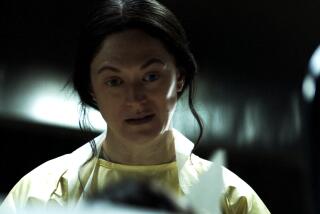Looking Beyond the Birth
- Share via
Sometimes we miss the obvious. Amid all the festivities of Christmas, we are cautioned to remember the birth of Christ. Far less often, we are reminded to look beyond the birth and consider the Incarnation.
While the birth of Jesus is a joyous event, the Incarnation is the beginning of something unexpected: the restoration of humanity to a state of grace greater than that of Adam and Eve before the Fall. In the Christmas season, we might do well to contemplate the Incarnation, especially because it requires from us a response.
Taking the road less traveled, I’d like to suggest a few offbeat--if not necessarily new--ideas about the Incarnation for your contemplation:
An Act of Intimacy: In considering the Incarnation, we must remember that Jesus existed before his conception. In fact, we believe, in the words of the Nicene Creed, “through him all things were made.” Through Jesus, God freely chose to share in the human experience, shrinking back from nothing and participating in our world as one of us.
Though Lord of all creation, he was subject to Joseph and Mary, his creatures. Though the author of life, he submitted to its rules--sleeping, eating, drinking and even passing out that which his body could not use. He bore the limits of human communication, and struggled to reveal the kingdom of God in human words and actions. He endured the same politics among his followers that we suffer today, and he paid his taxes. Even in the miracles, he never violated nature: Stones did not become bread, animals did not speak, it did not rain wine. Although he did not create death, he submitted to it for our sake, because it was the will of the Father.
Being both God and man, inseparably joined, Jesus carried this intimacy in his own body. He showed a perfect union between the divine and the human in every moment of his life. By his life, Jesus again blessed Creation and declared it good, and proved the love of God for Creation by his life, death and resurrection. Whatever Jesus did as a man would be forever blessed and proven good.
In the greatest intimacy of all, Jesus did not reject his humanity at the Resurrection. Rather than leave us merely enlightened, he rose to the Father while beckoning to us to follow and share his glory.
Contagion: “The Faith is caught before it is taught,” my pastor often says. Jesus introduced a new glory into human life, almost like a virus. Instead of illness and death, this contagion brings life and a share in God’s glory.
The Incarnation makes it possible for us to become part of the Body of Christ and do the same things he did. As part of his Body, we heal the sick and raise the dead--after all, where did hospitals come from? We challenge those in power by our lives and words, and we bring the love of God to the poor and those rejected by society through counseling, food, and support. Anyone surrendering their life to God will become at least a bit more like Jesus.
The Ongoing Work of Creation: Just as God breathed life into man at the Creation, so too does Jesus breathe life into us through the Holy Spirit. We are truly a new Creation, for we too have received the Spirit of God.
Writers such as St. Irenaeus and St. Thomas Aquinas expressed a movement of Creation coming forth from God and then returning to God. Creation was not something God did a long time ago. It is ongoing. Thomas Merton, commenting on the writings of Irenaeus, said he saw “man as an indefinite possibility of growth.” The Incarnation opened up new possibilities for growth, and made a path to God for all of Creation. The Incarnation was a continuing of the work of Creation, and we are called to join the great procession joyfully leading all Creation back to God.
Our Response: The Word of God, made flesh in the Incarnation, did not consider humanity below his concern. As Jesus did not reject us, we can reject no one. As Jesus shared in our poverty, we are called to share in the poverty of others. In our relationships with others may be found a kind of second Incarnation as the Body of Christ comes to the world again and again, loving, sharing, finding the lost and feeding the hungry.
*
On Faith is a forum for Orange County clergy and others to offer their views on religious topics of general interest. Submissions, which will be published at the discretion of The Times and are subject to editing, should be delivered to Orange County religion page editor Jack Robinson.






